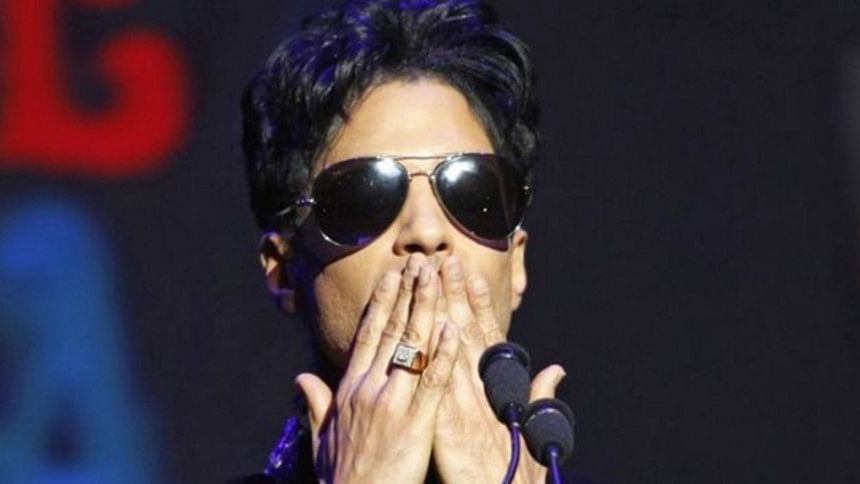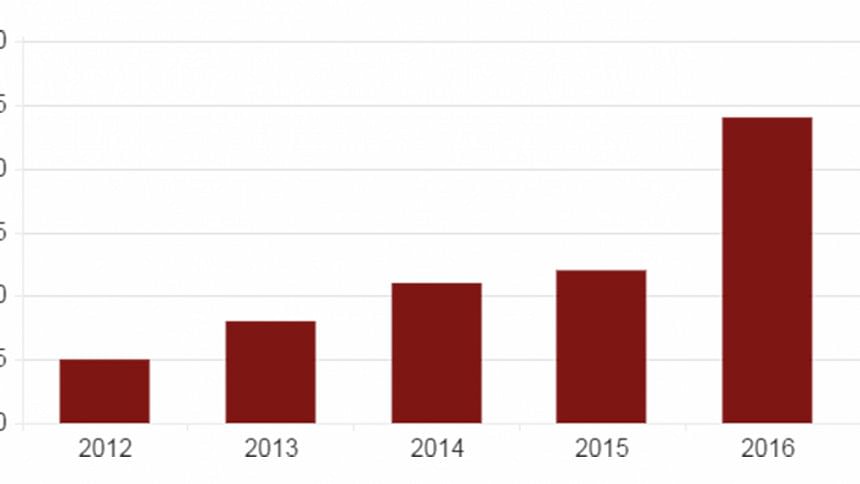Why so many celebrities have died in 2016

We are only four months in, but it's already been a dark, dark 2016.
It now seems rare for a week to pass without a significant celebrity death being reported - from David Bowie in the second week of January, to actor Alan Rickman a week later, to comedian Victoria Wood and Prince this week.
"Enough, 2016" and a more vulgar alternative are phrases people are uttering more and more regularly. So is this wave of celebrity deaths the new normal?
The answer is yes, according to the BBC's obituary editor Nick Serpell, who ought to know about such things.
He says the number of significant deaths this year has been "phenomenal".
Looking at the basic statistics, there's a very clear upward trend. Nick prepares obituaries for BBC television, radio and online, that run once a notable person's death is confirmed.
The number of his obituaries used across BBC outlets in recent years has leaped considerably.
It's a jump from only five between January and late March 2012 to a staggering 24in the same period this year - an almost five-fold increase. And that's before counting some of the notable deaths in April, including American singer Merle Haggard, the former drug smuggler Howard Marks and this week's two notable departures.
But might it just be that the BBC has increased its store of obituaries to such an extent it means plenty more are being used?
There are indeed more obituaries in the BBC's files - some 1,500 in total - than when Nick started 10 years ago, he says. He adds a few more every week.

But look elsewhere and the picture bears out.
Here in the UK, the Daily Telegraph maintains a gallery of famous people who have died, and updates it throughout the year. Up to this time in 2014, the number of those in the gallery was 38. By this time last year, the number of people in the gallery was 30. This year, the number is already 75.
At the beginning of every year, the (rather morbid) website deathlist.net lists 50 celebrities it believes may pass away that year. In six of the last 10 years, two or fewer of its predictions had come true by this time - this year, five names have died so far.
This all invites the question: why?
There are a few reasons, Nick Serpell says.
"People who started becoming famous in the 1960s are now entering their 70s and are starting to die," he says.
"There are also more famous people than there used to be," he says. "In my father or grandfather's generation, the only famous people really were from cinema - there was no television.
"Then, if anybody wasn't on TV, they weren't famous."
Many of those now dying belonged to the so-called baby-boom generation, born between 1946 and 1964, that saw a huge growth in population. In the US for example, the census bureau said that 76m people in 2014 belonged to the baby boomer generation - some 23% of the population.
Here in the UK, people aged 65 or older make up almost 18% of the population - a 47% increase on forty years ago.
With more babies born into the baby-boom generation, it meant more went on to eventually become famous.
Now, those famous former babies, aged between 70 and 52, are dying.
The age-bracket 65 to 69 is the one, in the UK for example, where death rates really start to increase - some 14.2 per 1,000 men in that age bracket died in 2014, compared with 9.4 per 1,000 in the 60 to 64 age bracket.
Among the major deaths this year, many - including Prince (57), Alan Rickman (69), David Bowie (69) and Victoria Wood (62) - were baby-boomers.
WHAT MAKES A CELEBRITY?
Another factor that may play into the impression that more celebrities are dying is that we have heard of more celebrities than before.
"Over the past 10 years, social media has played a big part," Nick Serpell says.
Hours before Prince's death was announced, tributes were paid to the American former wrestler and porn star Chyna, who died aged 45.
But the news of her death was not confined to the US - close to 400,000 tweets using the word Chyna were sent worldwide on Thursday, and interest peaked in cities such as Lagos in Nigeria and Lima in Peru.
These days, it is far easier to hear news of whether anyone has died than at any time in the past.
WILL THIS CARRY ON?
The bad news? Yes, probably. "Over the next 10 years, these people will get into their 80s and it is going to continue at this level," Nick Serpell says.
"And that doesn't count the surprise deaths, when people die that shouldn't."
For the time being, the normally half-hour compilation of obituaries Nick produces for BBC News at the end of every year will be extended: this year, he says he has already been given permission to make it an hour long.

 For all latest news, follow The Daily Star's Google News channel.
For all latest news, follow The Daily Star's Google News channel. 








Comments